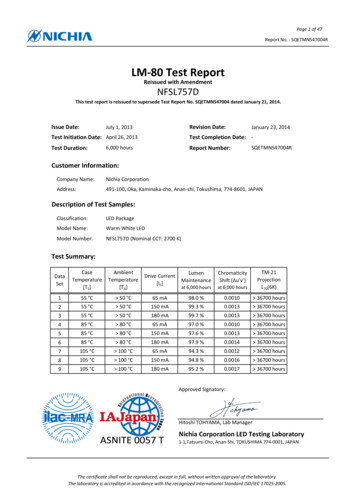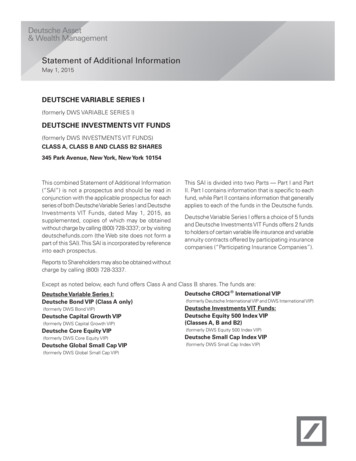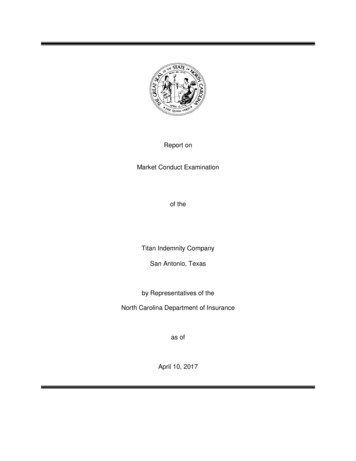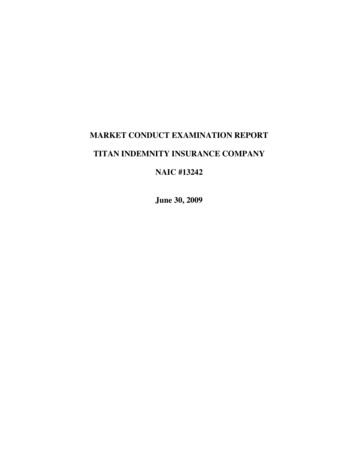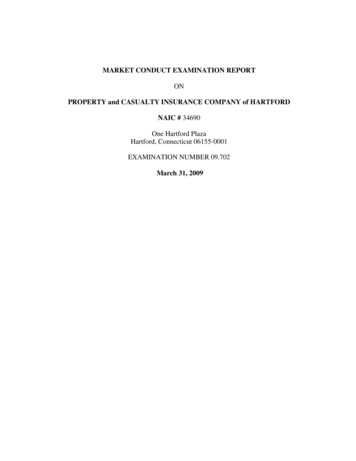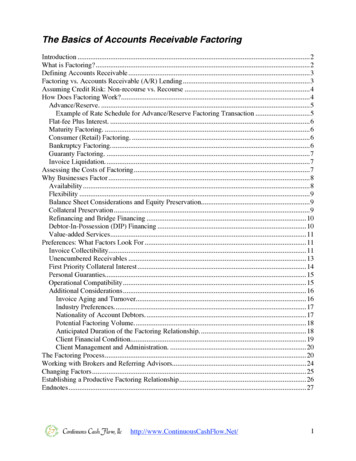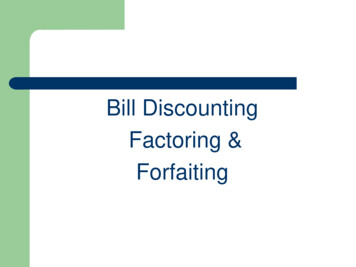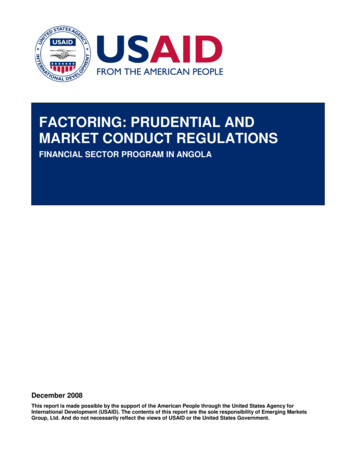
Transcription
FACTORING: PRUDENTIAL ANDMARKET CONDUCT REGULATIONSFINANCIAL SECTOR PROGRAM IN ANGOLADecember 2008This report is made possible by the support of the American People through the United States Agency forInternational Development (USAID). The contents of this report are the sole responsibility of Emerging MarketsGroup, Ltd. And do not necessarily reflect the views of USAID or the United States Government.
FACTORING: PRUDENTIAL AND MARKETCONDUCT REGULATIONSFINANCIAL SECTOR PROGRAM IN ANGOLASubmitted by:Emerging Markets Group, Ltd.Submitted to:USAID/AngolaContract No.:GS-23F-0168PDISCLAIMERThe author’s views expressed in this publication do not necessarily reflect the views of the United States Agency forInternational Development or the United States Government.
TABLE OF CONTENTSPART IINTRODUCTION .1PART IIPRUDENTIAL AND MARKET CONDUCT REGULATIONS .2ARTICLE 1ARTICLE 2PART IIIARTICLE 1ARTICLE 2ARTICLE 3ARTICLE 4ARTICLE 5ARTICLE 6ARTICLE 7ARTICLE 8ARTICLE 9PRUDENTIAL REGULATIONS .2MARKET CONDUCT REGULATIONS .3FACTORING REGULATIONS.3GENERAL PROVISIONS .3DEFINITIONS .4RIGHTS AND DUTIES OF THE PARTIES.4DISCLOSURE AND TRANSPARENCY .5TRANSFER OF RIGHTS .5OBLIGATION TO PAY .5DEBTOR’S RIGHTS VERSUS THE FACTOR .6RIGHTS OF RECOVERY .6APPLICABILITY TO FACTORING TRANSACTIONS OF CERTAIN INCENTIVES AND EXEMPTIONS .6Factoring: Prudential and Market Conduct Regulationsi
PART IINTRODUCTIONIn all countries financial services companies are subject to regulation and supervision to different degrees.In considering the scope of supervision and regulation of financial services firms, consideration should begiven to public policy criteria and adequacy of resources for supervision and regulation.With respect to institutions that extend credit, there are three basic criteria as to whether, from thestandpoint of public policy, such institutions should be subject to licensing and to supervision andregulation. These criteria are: Whether the type of institution is a significant repository of savings of the public such that the failureof these types of institution could cause a significant shock to financial stability; Whether the type of institution is a direct participant in the clearing and settlement of payments suchthat the failure of a significant participant could disrupt the payments system; Whether the type of institution is a source of credit to the economy that has macroeconomicsignificance.A bank is the type of institution that clearly satisfies all three criteria in most countries. The basicdefinition of a bank, found in most banking laws, is an institution that both takes deposits from the publicand extends credit.If the type of institution does not take deposits from the public, extends only modest amounts of credit,and is not a direct participant in the clearing and settlement of payments, like financial leasing andfactoring companies, there is much less policy reason to subject such institutions to licensing andsupervision and regulation. Thus, for example, in some countries, consumer and commercial financecompanies, leasing companies and factoring companies are not subject to licensing or to supervision andregulation.In such countries these credit institutions are subject to market discipline for their funding and for theprovision of their services. If their asset quality is poor, they will not receive funding from the market or itwill be limited and expensive in the form of bank loans or issuance of commercial paper or bonds. Iftheir services are inefficient or abusive, they will lose customers. In either case particular institutions ofthis class would tend to become insignificant or exit from the market.Besides the public policy perspective with respect to licensing, supervision and regulation, anotherimportant concern is the practical issue of the resources available to the financial institutions’ supervisoryagency and whether it can devote sufficient resources to licensing and performing well the supervisionand regulation required for both institutions of systemic significance like banks and other institutions likefactoring or leasing companies.In Angola, leasing and factoring companies would not fund themselves by deposits, would not be directparticipants in the clearing and settlement of payments, and would not be sources of credit ofmacroeconomic significance. Therefore, an argument could be made on public policy grounds that theyshould not be subject to licensing or to supervision and regulation. However, the Law on FinancialInstitutions provides that Banco Nacional de Angola will regulate and supervise them without specifyingthe degree.In light of the public policy factors above and the limited supervisory resources of the BNA that should bedevoted predominantly to banks, EMG recommends that the regulations applicable to both financialleasing and factoring companies be limited and the recommended prudential and market conductregulations have been designed accordingly.Factoring: Prudential and Market Conduct Regulations1
Banks that conduct financial leasing or factoring will be regulated no differently than they are for otherbank activities. Financial leasing and factoring operations will be separately accounted for butconsolidated with other accounts for purposes of capital adequacy and exposure limits.The prudential regulations for financial leasing and factoring companies include a minimum capitaladequacy ratio, a limit on exposure to one or related parties, a prohibition on transactions with partiesrelated to the companies, and a prohibition on guaranteeing liabilities of third parties. These are basicprudential limitations that seek to prevent important causes of financial institution failure. With respect toprovisioning for value impaired assets, this will be in accordance with accounting rules rather than withthe extensive rules for banks.The market conduct regulations for financial leasing and factoring companies seek to establish goodbusiness practices in disclosure of the terms and conditions of transactions so that financial leasing andfactoring clients will understand their rights and responsibilities in such transactions and will be able toexercise market discipline. The requirement for financial leasing and factoring companies of significantsize to have an external audit and to publish financial statements, facilitates market discipline with respectto funding of such companies.It must be emphasized that it is vitally important for both financial leasing and factoring to havecomprehensive proper rules for the underlying leasing and factoring transactions that are subject to theprudential and market conduct regulations. These rules are found in the core provisions of the UNIDROITmodels that represent a synthesis of best practices in countries in which financial leasing and factoringhave developed successfully. Otherwise there can be no assurance of expected compliance with Article2(d) of the regulation for financial leasing and Article 2(b) of the regulation for factoring. These addresscritical legal matters in financial leasing and factoring transactions that should not be left to chance, butrather given a proper foundation, preferably in law, as is best practice. If there is no proper underpinningof financial leasing and factoring transactions and they become problematic, it could discredit financialleasing and factoring as financial services in Angola for some time.PART IIPRUDENTIAL AND MARKET CONDUCT REGULATIONSBased on the authority of Banco Nacional de Angola (BNA) in Articles 4 and 6 of theLaw on Financial Institutions, BNA issues the following regulations:Article 1Prudential Regulationsa. Banks that directly conduct factoring are subject to applicable banking regulations with respect,inter alia, to: (i) minimum capital; (ii) regulatory capital; and (iii) limitations on claims on oneparty or related parties from factoring transactions.b. A factoring company must have minimum paid-in capital of Kz. fifty million or such otheramount as may be established by law or regulation from time to time.c. A factoring company must have a minimum regulatory capital (Racio de SolvabilidadeRegulamentar (RSR)) to risk assets ratio of eight (8%) percent. Risk assets are assets other thancash and claims on the central government of Angola.d. A factoring company’s claims on one party or related parties must not exceed fifteen percent ofits regulatory capital (RSR).e. In addition to its own capital, a factoring company may raise funds through: (i) loans madeabroad; (ii) loans from and financing from domestic financial institution; (iii) official andFactoring: Prudential and Market Conduct Regulations2
government-owned financial entities; (iv) public or private placements or obligations; (v) sales oflease contracts as well as credit instruments derived from such contracts.f.A factoring company must not enter into a factoring transaction with a party related to thefactoring company.g. A factoring company must not guaranty liabilities of third parties.Article 2Market Conduct Regulationsa. Before entering into a factoring contract, the prospective factor must disclose to the prospectiveclient all commissions and financial charges related to the factoring transaction, in accordancewith Banco Nacional de Angola regulations as well as generally accepted transparency practicesin the Angolan market.b. A factoring contract must provide at a minimum for: (i) rights and duties of the factor and client;(ii) whether the client will transfer to the factor any of the client's rights deriving from thecontract of sale of goods or services that generated the accounts receivable, including reserving tothe client title to the goods or creating any security interest; (iii) whether to the knowledge of theclient there are circumstances in connection with the client’s sale of goods or services for whichthe debtor may have a defense against a claim by the factor for the payment of accountsreceivable under that sale; and (iv) disclosure that non-performance or defective or lateperformance of the contract of sale of goods or services may entitle the debtor to recover from theclient a sum paid by the debtor to the factor.c. Factoring companies must maintain books of account in accordance with applicable accountingprinciples issued by the Banco Nacional de Angola.d. Factoring companies with liabilities to third parties exceeding Kz. 100 million as of the date oftheir last annual balance sheet must have an annual external audit by auditors authorized by Lawno. 3/01 of 23 March and must publish their annual financial statements and auditor’s opinion.Factoring entities with liabilities below that level must obtain the appropriate certificate from anaccount auditor certified by the Ministry of Finance.PART IIIFACTORING REGULATIONSArticle 1General Provisionsa. This Regulation governs factoring contracts and assignments of receivables as described in thisChapter.b. For the purposes of this Regulation, “factoring contract” means a contract concluded between oneparty (the supplier) and another party (the factor) pursuant to which:(1) The supplier may or will assign to the factor, receivables arising from contracts of sales ofgoods or services made between the supplier and its customers (debtors) other than those for thesale of goods bought primarily for their personal, family or household use;(2) The factor will perform the following functions:-- provide finance for the supplier, including but not limited to short-term trade creditsand advance payments; and,Factoring: Prudential and Market Conduct Regulations3
-- collection of receivables.(3) The factor may maintain accounts relating to the receivables;(4) Notice of the assignment of the receivables must be given to debtors.Article 2Definitionsa. Factoring (cessão financeira) is a short-term commercial transaction whereby a business sells itsaccounts receivables (faturas) at a discount. Factoring is not a loan and it involves at least threeparties: the invoice seller (aderente), the debtor (devedor), and the factor (cessionario ou factor).To be considered a factoring transaction, the maturity date from the time of purchase of theinvoice by the factor should not exceed 180 days.b. Factor ("Cessionário ou Factor"): an entity which acquires at a discount the account receivable orinvoice which represents value for the sale of a product or a service.c. Seller ("Aderente"): the party which sells its accounts receivable to the factor, normally at adiscount to its face value. This discount represents remuneration to the factor for services relatedto the purchase of the invoice and/or compensation for the cost of funds advanced under thefactoring transaction.d. Debtor (“Devedor”): the party which owes payment to the seller. In a factoring transaction, thedebtor pays the full value of the invoice to the factor.e. Factoring Companies ("Sociedades de Cessão Financeira"): are non-bank financial institutionswhose exclusive objective is to engage in factoring activities, in which one party (factor) acquiresfrom another party (supplier) short-term payment obligations resulting from the sale of productsor the provision of services to a third person (debtor) as permitted by law.f.“Recourse Factoring": Factoring in which the factor does not take the risk of bad debt. Inrecourse factoring the factor has recourse to the Seller and is able to reclaim from the Seller’sunpaid funds resulting from non-payment by the Debtor).g. Non-recourse Factoring: Factoring in which the factor accepts the bad debt risk. The factorassumes all rights, including legal rights, to pursue the customer for payment and the Seller isexempt from reimbursement of any losses due to non-payment by the Debtor.h. In this Regulation references to “goods” and “sale of goods” shall include services and the supplyof services.i.Regulations:1. A notice in writing need not be signed but must identify the person by whom or in whosename it is given;2. “Notice in writing” includes, but is not limited to, telex and any other telecommunicationcapable of being reproduced in tangible form;3. A notice in writing is given when it is received by the addressee.Article 3Rights and Duties of the PartiesConcerning the parties to the factoring contract:a. A provision in the factoring contract for the assignment of existing or future receivables shall notbe rendered invalid by the fact that the contract does not specify them individually, if at the timeFactoring: Prudential and Market Conduct Regulations4
of conclusion of the contract or when they come into existence they can be identified in thecontract.b. A provision in the factoring contract by which future receivables are assigned operates to transferthe receivables to the factor when they come into existence without the need for any new act oftransfer.Article 4Disclosure and Transparencya. A written contract, accounts receivable financing agreement, or similar written document, alongwith the commercial conduct of the parties in question, shall summarize and describe thefactoring transaction among the participating parties.b. The written agreement, a related schedule, or the commercial conduct of the parties shall includeor define at least the following points:1. Name and contact address of the parties to the transaction.2. Date on which the underlying transaction was executed.3. Date on which full payment of the discounted receivable or receivables is/are due.4. Statement of whether the receivable is discounted with or without full recourse to the factor.5. The amount due to the factor as full payment of the discounted receivable.6. The total amount of the facility.7. Other information which the parties to the contract (agreement) judge to be necessary to definethe proposed activity, to describe the services to be provided, to clarify the proposeddiscounting of receivables, and to facilitate collections and payment. This includes properdocumentation as well as representations and warranties as agreed by the contracting parties.Article 5Transfer of RightsA factoring contract may validly provide as between the parties thereto for the transfer, with or without anew act of transfer, of all or any of the supplier’s rights deriving from the contract of sale of goods,including the benefit of any provision in the contract of sale of goods reserving to the supplier title to thegoods or creating any security interest.Article 6Obligation to PayThe debtor is under an obligation to pay the factor only if the debtor does not have knowledge of anyother person’s superior right to payment and notice in writing of the assignment:a. Is given to the debtor by the supplier or by the factor with the supplier’s authority;b. Reasonably identifies the receivables which have been assigned and the factor to whom or forwhose account the debtor is required to make payment; andc. Relates to receivables arising under a contract of sale of goods made at or before the time noticeis given.Factoring: Prudential and Market Conduct Regulations5
Article 7Debtor’s Rights versus the Factor1. In a claim by the factor against the debtor for payment of a receivable arising under a contract ofsale of goods, the debtor may set up against the factor all defenses arising under that contract ofwhich the debtor could have availed itself if such claim had been made by the supplier.2. The debtor may also assert against the factor any right of set-off in respect of claims existingagainst the supplier in whose favor the receivables arose and available to the debtor at the time anotice in writing of assignment conforming to Article 8 was given to the debtor.Article 8Rights of Recovery1. Without prejudice to the debtor’s rights under Article 9, non-performance or defective or lateperformance of the contract of sale of goods shall not by itself entitle the debtor to recover a sumpaid by the debtor to the factor if the debtor has a right to recover that sum from the supplier.2. The debtor who has such a right to recover from the supplier a sum paid to the factor in respect ofa receivable shall nevertheless be entitled to recover that sum from the factor to the extent that:a. The factor has not discharged an obligation to make payment to the supplier in respect of thatreceivable; orb. The factor made such payment at a time when it knew of the supplier’s non-performance ordefective or late performance as regards the goods to which the debtor’s payment relates.Article 9Applicability to Factoring Transactions of Certain Incentives and ExemptionsAny incentiv
factoring or leasing companies. In Angola, leasing and factoring companies would not fund themselves by deposits, would not be direct participants in the clearing and settlement of payments, and would not be sources of credit of macroeconomic significance. Therefore, an argument could be
